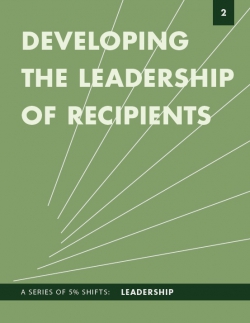Developing The Leadership of Recipients: A Series of 5% Shifts
About this Series:
This series highlights “5% shifts” – as we are calling them – that don’t rely on organizations completely changing course and reinventing themselves. We lift up shifts that are both simple and achievable, to inspire service providers to adapt what works. These reports are structured to include both conceptual framing based on research and literature in the sector, as well as case studies of on-the-ground experiments initiated by organizations. They also include discussion materials and other resources to help staff and leaders reflect on the case examples and apply the lessons to their own organizations. We hope that organizations will take what is useful, build on their strengths, and exercise judgment and wisdom in tailoring these examples to make “5% shifts” that fit their specific community and organizational contexts. We invite organizations to spread these lessons and learning throughout the nonprofit sector, and to reach out to BMP to share experiences or to request additional resources or coaching. Feel free to email us at [email protected].
About this Report:
Leadership is closely tied to notions of confidence, agency and authority in our culture. Too often, structural inequities restrict the opportunities for people to develop those self-perceptions and exercise leadership, particularly for people who find themselves in need of formal supportive services. Even within the nonprofit sector, issues of power imbalances that are embedded throughout society can be replicated within organizations and provider/client relationships. For instance, due to the lack of representation of voices from communities most likely to receive services, the systems and structures that govern public benefits and services often demand compliance to rules that recipients have not had a role in shaping. Additionally, the professionalization of service delivery – which has been the subject of long-standing debate in social work theory1 – can over-emphasize the power of the “expert” deliverers of services and reduce constituent’s voice in advocating for themselves and their communities. In spite of these broader societal barriers and dynamics in the sector, organizations find a wide range of ways to develop clients as leaders, strengthen their self-image, and build their capacity to act on their own behalf.
This report includes two case studies of leadership development efforts by nonprofit organizations. At the Rosa Parks Children and Youth Program in Detroit, a junior counselor program has been very impactful on the leadership skills of young adults. By enlisting teenagers to support younger children attending tutoring, summer camp and art therapy sessions, the program builds a pipeline that keeps youth engaged as they age, and builds their self-esteem and capacity to lead in other parts of their lives as well. The second case study examines the Client Advisory Board (CAB) at Bread for the City – a frontline agency serving the poor in Washington, DC. The CAB builds on the organization’s tradition of client engagement and voice throughout its programs, and has helped empower clients to have a say as individuals and as a collective. Clients who have been members of the CAB have developed new programmatic areas of the organization and even taken their leadership skills out into their community. In both cases, the participants gain concrete skills that are valued in the workplace, but more importantly, the programs help to shift the relationships between staff and clients towards mutual respect as peers and transform participants’ self-image and sense of efficacy in the world.

